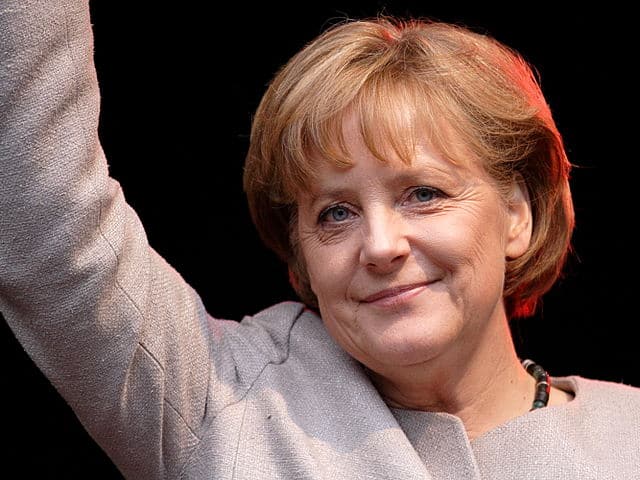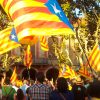
Angela Merkel is not only German, she is Germany. She is European, but she is not Europe, even though some outsiders view her as such. And she is not Europe precisely because she is Germany. Her latest victory in the elections on Sunday, while expected, heralds a new phase for the EU, albeit limited by virtue of her being Germany and having now to face a more complex parliamentary landscape that may impede her pro-European views. Merkel has emerged weakened from the elections. Is the same true of Germany?
What will she do with her victory? It is not clear. This is because, as the French writer Marion Van Renterghem has said of her, Merkel is a UFO (Unidentified Flying Object) in an EU that, as Jacques Delors would have said, is a UPO (Unidentified Political Object). And secondly it is because her own party, the CDU-CSU, has lost ground. The social-democrat debacle obliges the SDP to ditch the idea of a Grand Coalition and rebuild its programme and leadership from the opposition. Merkel will have to assemble a new coalition with liberals and Greens, something that promises to be both inevitable (there is no alternative) and complex. Added to this is the accession to the Bundestag of the anti-European, xenophobic and revisionist AfD, Alternative for Germany, as the third largest power with 94 deputies. It is a bad combination for a Europe that had been gearing up to re-launch itself, although not so tragic when compared to the tectonic shifts occurring in other European societies.
The whole of Europe had been waiting for these elections in order to embark on a new phase, after Brexit, Trump and the consoling victory of Emmanuel Macron in France. The latter, who is set to make it explicit in a speech, is proposing a significant shared budget, at least for the Eurozone, a full banking union, a European Economy and Finance Minister, and common defence for the willing and able. In principle, they are the same proposals that Merkel supports. But there are major differences in the details.
Whereas France wants a shared budget equivalent to various percentage points of GDP, Germany sees something much more limited, even more so in the case of the German liberals. Nor does Merkel want a European guarantee of basic deposits, and she would be prepared to transform the European Stability Mechanism into a European Monetary Fund. There is also agreement on European defence, helped by the UK’s withdrawal. There are, however, other views. As opposed to the variable geometry envisaged by Merkel and Macron, the President of the European Commission, Jean Claude Juncker, wants equal integration for all, and everyone part of the euro by 2019, an idea that causes misgivings at the Bundesbank. Notwithstanding this, a new stage in the construction of Europe may be in prospect, without tinkering excessively with the treaties and thereby avoiding referendums. But first Merkel will need to assemble her coalition, something that will take time.
The greatest discrepancies, however, relate to economic policy. Macron is calling for financial stability, solidarity and stimulus. This means re-launching the economy (which is already growing in the EU) with more public spending, and Germany reducing its budget and trade surplus, the largest in the world. But Merkel is Germany, and the Germans, who threw themselves behind industry while the rest of the Europeans de-industrialised, are opposed to such a step.
The liberals have already signalled their intention to demand the crucial Finance portfolio, where Wolfgang Schäuble has seen the entire euro crisis unfold, with an attitude displaying even less solidarity. This could lead to a Germany that is even less disposed to responding to French (and Spanish) proposals. So Macron, having earned credibility in Berlin for embarking upon his labour reforms, will try to exert some influence on the programme on which the new governing coalition in Germany will be based.
Beyond the European question there are other differences with Merkel-Germany, for example on China. Merkel and Macron want a European mechanism enabling it to shield itself from the purchase of strategic businesses from outside the EU, namely from China. Others see it differently. But in terms of trade with China, Germany is much more open than France, given its exports of high-end cars and advanced engineering to the Asian economic giant.
All eyes are on Merkel. These include Putin’s, who knows her well, and Trump’s, although Merkel is more distant from him. In this too she personifies Germany. Germans’ (and many other Europeans’) trust in the current US President is at rock bottom according to various surveys. In fact, residents of G20 countries are generally much more confident that Merkel rather than Trump will do the right thing in international affairs. In other words, Merkel has the chance in this, her fourth term, to become both a European leader (which she is already) and a world leader. The fact is that Germany has become increasingly global.
Merkel has a calm leadership style that does not leave others feeling humiliated. She often lacks, or is completely devoid of, vision. The euro crisis was managed step by step, until it dawned on her that the following meeting was never going to be the conclusive one. She showed courage amid the tide of refugees, and her welcoming stance cost her votes in the election, even though she emerged victorious. The word ‘leadership’ seems not to feature in her vocabulary, although perhaps she can exercise it without appearing to. She will have to do so. Europe awaits her.


